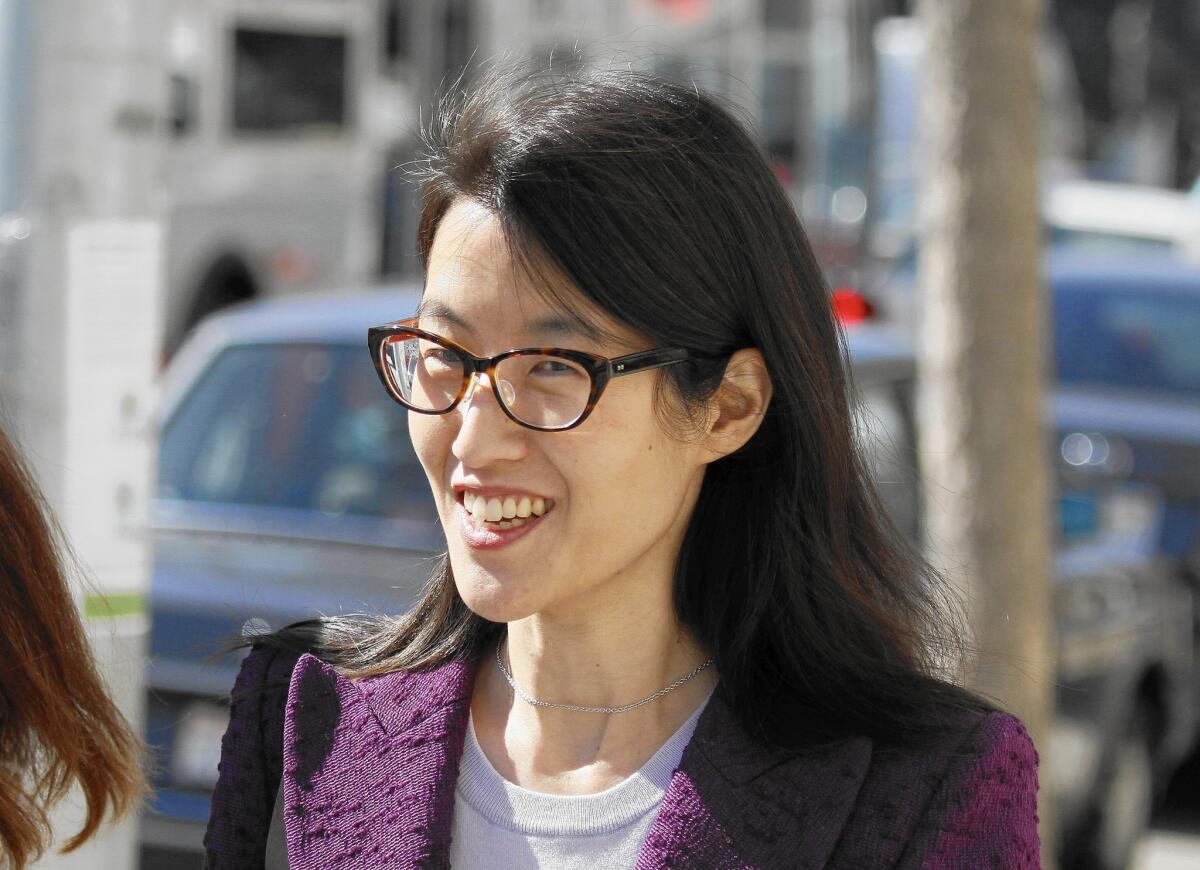Ellen Pao’s next act targets Silicon Valley’s diversity problem

- Share via
At the top of Ellen Pao’s Twitter feed is a quote from the author Toni Morrison, part of which reads “if you have some power, then your job is to empower somebody else.”
Pao may no longer hold the same traditionally powerful roles she’s held in the past — either at Silicon Valley venture capital firm Kleiner Perkins Caufield & Byers, where she lost her high-profile discrimination case against last year, or as interim chief executive of Reddit, where she resigned after widespread criticism.
But she appears to be putting those experiences to work in her next act: a new effort, with seven other women in Silicon Valley, to help empower start-up leaders to improve diversity through sharing ideas and collecting data from tech companies.
The group that is launching Project Include, announced Tuesday and first reported in the New York Times, includes not only Pao — who is leading the effort, teammates say — but a group of women who have put a spotlight on diversity problems in Silicon Valley. They include Erica Baker, an engineer at the messaging app Slack who gained attention when she started a salary spreadsheet while working at Google, as well as Tracy Chou, a Pinterest software engineer who set up a place in 2013 for people to share numbers on female engineers.
Other members of the founding team include Susan Wu, an entrepreneur and investor who works at the mobile payments start-up Stripe; Laura Gomez, whose software start-up is aimed at helping companies recruit more diverse employees; Y-Vonne Hutchinson, a former labor lawyer who leads a diversity consulting firm; Bethanye McKinney Blount, a former engineering executive at Reddit; and Freada Kapor Klein, a partner at Kapor Capital and the Kapor Center for Social Impact who is a longtime advocate for diversity in the tech industry.
Although much of the attention on diversity in Silicon Valley has been aimed at large companies such as Google, Yahoo and Facebook — all of which began releasing their diversity statistics in recent years — this group is aimed at CEOs of start-ups and medium-size companies, an effort to get companies focused on the issue in its early stage.
“We wanted to focus on a group that could create meaningful change and have similar enough needs that we could address them on a website,” Pao said in an interview. But she also notes that they’re addressing leaders of companies small enough that it’s “before a lot of these problems have been built in and are almost impossible for us as individuals to try to change.”
The group’s website acts as a practical how-to guide for leaders wanting to make their companies more diverse. For instance, it suggests ways to reduce bias from the interview process, build teams and improve performance reviews. What does Project Include offer that’s not already widely available? Perhaps most distinctive are the personal experiences the group can offer, with many of them having either worked as engineers or leaders in the industry itself.
“I’ve had a steady stream of women who’ve never worked a day in tech approaching me to refer them to start-ups who might use their services,” Kapor Klein said. This group, she noted, is “very engineering heavy,” a background that could play well with start-up tech CEOs. “That’s unusual — not just about being able to build things for the group, but for the perspective and the lens for coming up with recommendations.”
The women behind Project Include hope to work with up to 18 start-ups or mid-size companies, building a community, sharing best practices and tracking data. It hopes the group will form a sort of community — probably using email or a messaging tool like Slack — in which start-up CEOs can swap data, practices and problems.
I hope we get people having these hard conversations about these trade-offs and about making diversity work.
— Ellen Pao
“I hope we get people having these hard conversations about these trade-offs and about making diversity work,” Pao said, such as, “Do I fire that phenomenal engineer who’s super productive but also super toxic?”
Currently, the goal is for the group to have a series of meetings with the start-ups over a period of months, tracking diversity metrics, facilitating discussion forums and eventually publishing data about how the companies progress on diversity metrics. For now, they plan to publish only aggregate, anonymous data on the start-ups’ diversity statistics.
Interested start-ups will not pay anything to be part of the effort, which is a volunteer side project for all the women involved, though Pao said they’d have to see how “sustainable” that is.
In the end, she said, the group’s goal is to help “accelerate” diversity in Silicon Valley, getting companies started earlier and turn what’s become a hot-button topic into more action. “Knowledge is power,” she said. “Being able to bring our knowledge to others so they don’t have to make the same mistakes and start closer to the finish line is one of the driving goals.”
Jena McGregor writes a column analyzing leadership in the news for the Washington Post’s On Leadership section.
ALSO
3 strategies to fund your child’s college education
Square results beat analysts’ expectations. So why did shares plunge 21%?
Lawsuit accuses Middle East bank of stealing an Orange County entrepreneur’s technology
More to Read
Inside the business of entertainment
The Wide Shot brings you news, analysis and insights on everything from streaming wars to production — and what it all means for the future.
You may occasionally receive promotional content from the Los Angeles Times.










